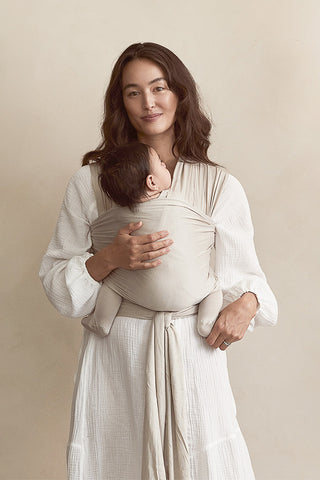Our most recent collaboration with Samantha Varvel features Petite Fleurs, a delicate floral print inspired by her mother’s home in France. It’s a nod to the charm and simplicity of French living—and it got us thinking about another French-inspired perspective that’s been making parents smile, pause, and rethink their routines for years: Bringing Up Bébé by Pamela Druckerman.
Parenting books can sometimes feel like a never-ending to-do list—but every once in a while, one comes along that makes you pause, smile, and think, “Oh, I could actually try that.” That’s exactly how Bringing Up Bébé feels. Part memoir, part parenting guide, it follows an American mom raising her kids in Paris and noticing just how differently (and gracefully) French parents approach the everyday challenges of raising little ones.
It’s equal parts charming and practical, with lessons that feel less like rules and more like a gentle shift in perspective. Here are a few of our favorite takeaways:
Independence
French parents believe kids are capable of more than we often give them credit for. From letting babies learn to self-soothe to encouraging toddlers to feed themselves, they trust their little ones to rise to the occasion. In the book, Druckerman describes a playdate where the French children happily entertained themselves with blocks and dolls while their parents sipped coffee and chatted nearby—no constant hovering, no need to referee every moment. It’s not about pushing kids too soon; it’s about giving them the space to try, stumble, and grow in confidence.
Structure
There’s something lovely about the calm rhythm French families build into their days. Meals, naps, and playtime aren’t rushed or over-scheduled—they unfold with a sense of order that teaches kids patience and self-control. Druckerman points out how French parents encourage their toddlers to wait for meals rather than offering endless snacks, reinforcing the idea that patience is part of daily life. It’s a reminder that structure doesn’t have to feel rigid. It can feel comforting, like a familiar rhythm that helps everyone breathe a little easier.
Mealtime
Instead of chicken nuggets on repeat (no shame, we’ve all been there), French parents treat food as an adventure. Kids are invited to try new flavors, linger at the table, and experience food as joy, not a battle. Druckerman describes sitting down to lunch with a French family where the children happily ate fish and spinach without complaint. And unlike the grazing culture common in the U.S., French kids generally eat four times a day—breakfast, lunch, goûter (a sweet afternoon snack), and dinner—which helps them come to the table hungry and curious.
Sleeping
French babies often sleep through the night much earlier. Parents practice “the pause”—waiting a beat before rushing in—which helps babies learn to settle themselves. Druckerman tells the story of her pediatrician gently encouraging her to give her baby a moment before intervening at night, advice that led to longer stretches of sleep for everyone. It’s not about ignoring babies; it’s about teaching them a skill that benefits the whole family.
Authority
French parents are confident, but not harsh. They set boundaries with clarity and consistency, without losing their sense of calm. Druckerman recalls moments in Parisian playgrounds where parents calmly but firmly told their children non—and that was the end of it. No pleading, no bribing, just steady authority that kids came to expect. It’s less about because I said so and more about quiet confidence.
What We Can Take Away
Not every French parenting strategy will work for every family, and that’s okay. There are however, nuggets of wisdom to be gleaned from different cultures and places and the heart of it—the patience, rhythms, and trust—is worth considering. At the end of the day, Bringing Up Bébé is a reminder that parenting doesn’t have to be frantic or perfect. It can be thoughtful, steady, and full of connection. And that little shift might just be the most refreshing parenting tip of all.










